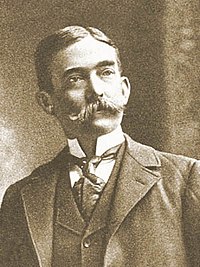William Wright Heard
| William Wright (W. W.) Heard | |
|---|---|
 |
|
| 32nd Governor of Louisiana | |
|
In office May 8, 1900 – May 10, 1904 |
|
| Lieutenant | Albert Estopinal |
| Preceded by | Murphy J. Foster, Sr. |
| Succeeded by | Newton C. Blanchard |
| Louisiana State Representative from Union Parish | |
|
In office 1884–1888 |
|
| Preceded by | B. F. Dillard |
| Succeeded by | G. A. Burton |
| Louisiana State Senator from Union and Lincoln parishes | |
|
In office 1888–1892 |
|
| Preceded by | G. L. Gaskins Elisha T. Sellers |
| Succeeded by | Hiram R. Lott W. A. VanHook |
| Louisiana State Auditor | |
|
In office 1892–1900 |
|
| Personal details | |
| Born |
April 28, 1853 Shiloh, Union Parish Louisiana, USA |
| Died | May 31, 1926 (aged 73) New Orleans, Louisiana |
| Resting place | Metairie Cemetery in New Orleans |
| Political party | Democratic |
| Spouse(s) | Isabella Manning Heard (married 1879) |
| Children | Seventeen children |
| Religion | Baptist |
William Wright (W. W.) Heard (April 28, 1853 - May 31, 1926) was the 32nd Governor of Louisiana from 1900 to 1904. His governorship saw the start of the Louisiana's oil and gas industry.
Heard was educated in a local school in his native Union Parish. He long remembered the challenges of educating children in rural areas. Heard worked to create the first Louisiana State Board of Education.
On December 3, 1878, Heard married the former Isbella E. Manning. The couple had seventeen children, including Louisiana Belle, Manning, William Wright Heard, Jr., and Alma, who died as a toddler.
In 1884, Heard was elected to the Louisiana House of Representatives from Union Parish in north Louisiana, based about Farmerville. After a single four-year term, he was elected in 1888 to the Louisiana State Senate for a four-year term. In 1892, Heard was elected as Louisiana state auditor, a position that he held for two terms of eight years. The auditor's position is no longer elected.
As a protégé of the outgoing governor, Murphy James Foster, Sr., Heard was controversially hand-picked by Foster to succeed him at the Democratic state convention of 1900 at a time before Louisiana held primary elections. Heard was a member of the Democratic Party, but he had Populist tendencies and was a supporter of the expanded coinage of silver.
At the general election, he defeated two Republicans running on separate tickets, both of whom received less than 22 percent of the vote following the mass-scale disenfranchisement of African American voters via Jim Crow laws. Reflecting this was the dramatic decline in voting, from a post-Reconstruction high in the 1896 statewide election of over 203,000 votes down to only 76,000 by 1900. Not until 1940 would more than 200,000 voters participate in a general election for governor. This 1900 election also marked the last time Republicans would have any real presence in the legislature until the 1960s.
...
Wikipedia
